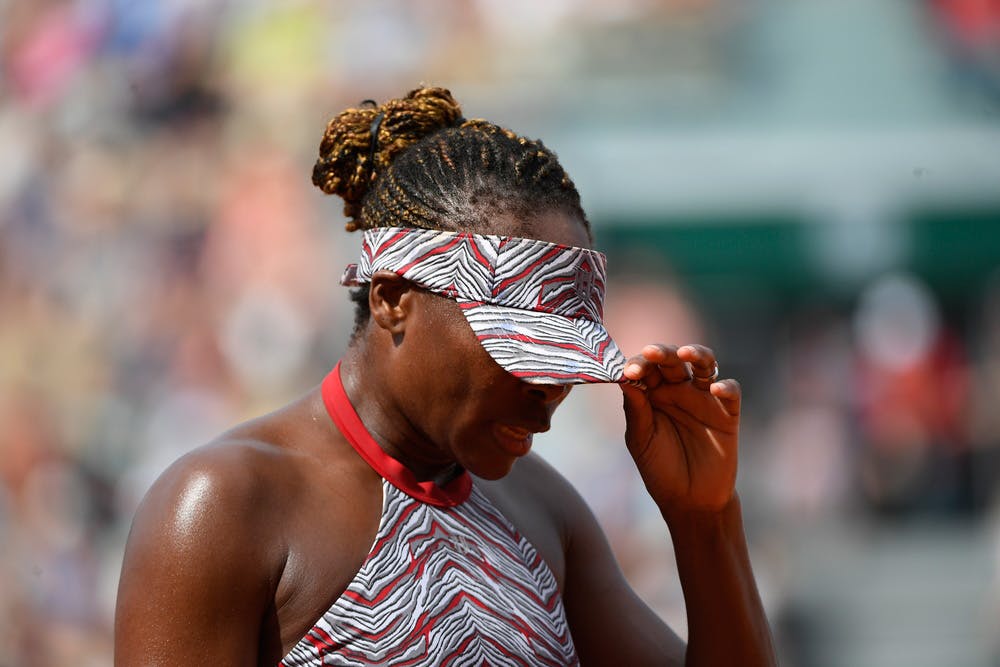Related
Serena and Venus pair up
The evergreen American's 21st Roland-Garros campaign was halted in the first round by her Chinese opponent.

An extraordinary 21st appearance at Roland-Garros should have been a celebration for 37-year-old Venus Williams; but instead her 100 minutes on Court Suzanne-Lenglen yielded a 6-4 7-5 first-round defeat at the hands of world No.91 Qiang Wang, and along with it an unhappy new career landmark.
For the first time in 78 Grand Slam appearances stretching back to 1997 she has lost in the first round of two successive majors, following her exit in Australia at the hands of Belinda Bencic.
Even though it is 10 years since Williams progressed beyond the fourth round here, her third defeat in 2018 to a player outside the top 50 was a bitter pill to swallow. In her post-match press conference her tone was always courteous, but her answers were understandably brief – and it was noticeable that she avoided answering when asked if she has any physical problem.
“Are you concerned? That’s sweet of you. Thank you,” she said. “It didn’t surprise me that she played well – everybody plays me well. Nobody plans on this [successive first round Slam defeats]. There are no perfect days in tennis. What could I have done differently? I think…win the point.”
Twelve months ago, Venus dismissed the Chinese from this tournament at exactly the same stage, and weeks later despatched again her at Wimbledon on the way to the final. But Wang used what she learned from those two defeats, converting the information into just the second top-10 win of her career.
“Before this match I didn’t think I would win it,” said Wang. “But when I played her last year, I saw how she played the big points really well, and that was what I tried to do here – really go for it, rather than just wait for her to go wrong. I am very happy.”
Throughout the match Venus struggled horribly to find her first serve and was punished on her second by hard-working Wang. Worse still, Venus double-faulted on break point at the business end of either set, leaving Wang to serve it out.
But in truth the 37-year-old American’s problems started from the off, as she began the match with a seven-deuce, 12-minute service game. Wang needed six break points and when she finally succeeded, it was only to surrender the hard-won advantage in the very next game.
Winner, Winner
— Roland-Garros (@rolandgarros) May 27, 2018
Qiang Wang avenges her 2017 Roland-Garros loss to Venus Williams, defeating the No.9 seed 6-4 7-5 for the biggest win of her career.#RG18 pic.twitter.com/Qc6ZcRFuH8
Yet for Venus, the crisis never conclusively passed. Repeated problems with her ball toss pestered her throughout the match. She seemed ill at ease, less with Wang than with herself. So often her on-court signature is her great stillness of demeanour; but here she was ruffled, albeit not to the extent that she questioned any line call. Her dialogue was entirely with herself, squawking indignantly as she got her racket edge on to a smash, only to drive it into the far backboard, yards beyond its intended target; then exclaiming in frustration at an errant backhand; and yelping as she double-faulted to give Wang the 5-4 break, from where the Chinese served it out.
Wang was engaging to watch, at times leaping off the ground in a scissor-kick to wallop a winner from either side. For a while it seemed Venus was incongruously gaining energy throughout the match, beginning it as if drained and then leaping out to a 3-0 lead in the second.
But full recovery never arrived. Wang levelled and even had a point to break for 5-4 before Williams’ backhand saved her again, as it had previously. Yet too many times Venus didn’t close out the point, and when Wang’s solid industry brought up two chances for 6-5, the American once again double-faulted. One game later, Williams’ unhappy 21st anniversary was complete.